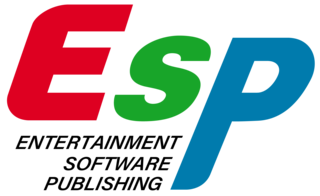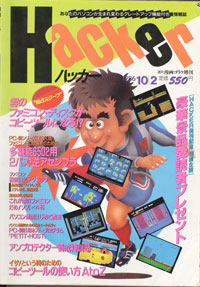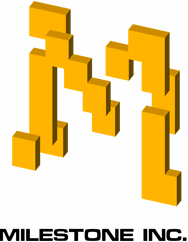 W
WAicom was a Japanese video game developer, founded in 1988, possibly by a group that left Jaleco. Despite evidence to support this, the Sammy corporate website lists 1990 as the first year and that it was a subsidiary. It was bought by Sammy Industry in 1992.
 W
WAlchemist was a Japanese video game publisher. It specialized in the development of visual novels for use on home video game consoles such as the PlayStation 2 and the Dreamcast. They declared bankruptcy on April 1, 2016.
 W
WAlphaDream Corporation, Ltd. was a video game development company founded in 2000 by Tetsuo Mizuno and Chihiro Fujioka in Tokyo, Japan. In partnership with Nintendo, it produced software for the Game Boy Color, Game Boy Advance, Nintendo DS, Nintendo 3DS, and Nintendo Switch, including the Mario & Luigi series. The company's staff included former developers from Square, such as Yoshihiko Maekawa. On October 2, 2019, AlphaDream was shut down after filing for bankruptcy.
Ambrella was a Japanese video game development company that worked under a publishing agreement with Nintendo. They were best known for making spin-off games for the Pokémon video game franchise, particularly the Pokémon Rumble series. Ambrella was formerly a part of Marigul Management.
 W
WAQ Interactive, Inc. was a Japanese video game developer and publisher. AQ stands for Artistic Quality. It was the parent company of the developers Artoon, Cavia and feelplus, and most recently the U.S. publisher Xseed Games. AQ Interactive and its subsidiaries produced games both under the AQ Interactive name, as well as developing for other publishers such as Microsoft Game Studios and Nintendo.
 W
WASCII Corporation was a Japanese publishing company based in Chiyoda, Tokyo. It became a subsidiary of Kadokawa Group Holdings in 2004, and merged with another Kadokawa subsidiary MediaWorks on April 1, 2008, and became ASCII Media Works. The company published Monthly ASCII as the main publication. ASCII is best known for creating the Derby Stallion video game series, the MSX computer, and the RPG Maker line of programming software.
 W
WAspect Co. Ltd was a Japanese based video game company which was founded in March 1991.
 W
WBanpresto Co., Ltd. was a Japanese toy company, and a former game developer and publisher, headquartered in the Shinagawa Seaside West Building in Shinagawa, Tokyo. The current iteration of the company was formed on April 1, 2008, with the focus on the toy consumer business. The company was dissolved in February 2019 and combined to Bandai Spirits, with the company getting all the rights and duties of Banpresto.
 W
WCareer Soft was a Japanese video game development studio founded in June 1996 by Team Career, a team within the Masaya Games, which was formed to develop Langrisser and Langrisser II. Career Soft continued to work with Masaya Games for the development of Langrisser III, Langrisser IV and Langrisser V.
 W
WCavia Inc. was a Japanese video game developer. The company name was apparently an acronym for Computer Amusement Visualizer, although the company web site also claims it refers to caviar.
 W
WCellius Inc. was a Japanese video game developer and publisher headquartered in Shibuya, Tokyo. It was founded in 2007 as a venture between Sony and Bandai Namco Holdings. The aim of the company is to "help take share from Microsoft Corp. and Nintendo Co." Sony hopes that the company will make up for the losses it made during quarter two of its financial year. 'Father of the PlayStation' Ken Kutaragi was announced as CEO. Bandai Namco Holdings held 51% of the company, and Sony held 49%. The company planned to use Sony's Cell microprocessor, the heart of the PlayStation 3, for PlayStation 3 games and games for mobile phones and personal computers. Its only video game project was a Ridge Racer game for the PlayStation Vita.
 W
WCing Inc. was an independent video game developer based out of Fukuoka, Japan. The company, a small development house employing only 29 people, was founded in April 1999, and was run by Takuya Miyagawa, who served as President and CEO. Miyagawa also acted as the producer on all of Cing's titles. The company filed for bankruptcy on March 1, 2010.
 W
WContrail was a Japanese video game production company best known for their work on Legend of Legaia and Wild Arms 2.
 W
WData East Corporation , also abbreviated as DECO, was a Japanese video game, pinball and electronic engineering company. The company was in operation from 1976 to 2003, and released 150 video game titles. Its main headquarters were located in Suginami, Tokyo. The American subsidiary, Data East USA, was headquartered in San Jose, California.
 W
WDimple Entertainment was a Japanese video game developer and publisher founded in November 2005 and headquartered in Chiyoda, Tokyo. They released a number of games beginning with Ayakashibito in August 2006, and would go on to develop and release others for the PlayStation 2, PlayStation Portable, and Nintendo DS. The company worked with other developers such as HuneX, Microvision, and Vanillaware before closing its doors in August 2010.
 W
WEIM Group was a Japanese game development company established in 1989 by programmer/musician Kenji Eno, who later started Warp.
 W
WELF Corporation , stylized as élf, was a Japanese eroge studio. One of its most popular games is Dōkyūsei, a pioneering dating sim, which has had a sequel and been turned into adult OVA series. The character design of the main villains from the -saku series is the company mascot. They are also known for role-playing video games such as the Dragon Knight series and visual novel adventure games such as YU-NO. Many ELF games had been turned into adult OVA series. Three of ELF game series had even been turned into TV anime series: Elf-ban Kakyūsei, Raimuiro Senkitan and YU-NO.
 W
WEnix Corporation was a Japanese video game publisher that produced video games, anime and manga. Enix is known for publishing the Dragon Quest series of role-playing video games.
 W
WEntertainment Software Publishing, Inc. (ESP) was a Japanese video game publisher headquartered in Shibuya, Tokyo. It was founded in 1997 as a publisher for games developed by the Game Developers Network (GD-NET). GD-NET, which included companies such as Treasure and Game Arts, was established due to concerns over smaller developers not having the same financial backing like larger game companies did, as production of console games was beginning to rise. ESP was best known for publishing shoot 'em ups and role-playing games. While primarily a publisher, ESP also developed a handful of games internally.
 W
WFill-in-Cafe (フィルインカフェ) was a video game developer that was founded in Japan in 1987. They are best known for creating the Asuka 120% series.
 W
WGamepot, Inc., was one of Japan's leading game publishers of massively multiplayer online games and mobile games.
 W
WHacker International was a Japanese video game company that developed and published games from 1990 to 2001 for the Nintendo Famicom, NEC PC Engine, Sony PlayStation consoles, and Microsoft Windows PCs. The company was known for its play-for-porn approach to gaming, with such games as AV Pachi-Slot and Soap Panic featuring female nudity as a reward for skilful playing. These games were usually distributed through mail order and sold approximately 30,000 to 50,000 copies each. Many of their games were developed by Taiwanese companies and were released in non-pornographic form elsewhere in the world; however three were released in the United States for the Nintendo Entertainment System with pornography intact by another Taiwanese company, Panesian.
 W
WHudson Soft Co., Ltd. was a Japanese video game company that released numerous games for video game consoles, home computers and mobile phones, mainly from the 1980s to the 2000s. It was headquartered in the Midtown Tower in Tokyo Midtown, Akasaka, Minato, Tokyo, Japan, with an additional office in the Hudson Building in Sapporo.
Human Corporation was a Japanese video game Video game developer and publisher founded in 1983. The company produced games for a number of platforms, including home consoles, portable consoles, and PC. Human declared bankruptcy in 2000 and disbanded. Its former members went on to form new companies including Nude Maker, Sandlot, Spike, and Grasshopper Manufacture.
 W
WImageepoch Inc. was a video game developer based out of Tokyo, Japan.
 W
WInterchannel, Inc. was a Japanese video game developer and publisher.
 W
WKID was a Japan-based company specializing in porting and developing bishōjo games.
 W
WKoei Co., Ltd. was a Japanese video game publisher, developer, and distributor founded in 1978. The company is known for its Dynasty Warriors games based on the novel Romance of the Three Kingdoms, as well as simulation games based on pseudo-historical events.
 W
WMarigul was a Japanese corporation created and jointly owned by video game company Nintendo Co., Ltd. (40%) and media company Recruit (60%). Its name is a combination of Nintendo's mascot Mario and Recruit's mascot Seegul.
 W
WMarvelous Entertainment Inc. (MMV) was a multinational corporation that produced animation, music, video games and television series. MMV is known for its involvement in the Story of Seasons series. They merged with AQ Interactive in 2011 and became Marvelous AQL.
 W
WMileStone Inc. was a Japanese video game developer. The team was composed mostly of ex-Compile developers who left to form their own company. They were best known for shoot 'em up games developed for the Dreamcast and its arcade counterpart, the Sega NAOMI.
 W
WMitchell Corporation (株式会社ミッチェル) was a Japanese video game developer based in the Suginami ward of Tokyo. Roy Ozaki served as president, and Koichi Niida served as vice-president. Some employees were former Capcom and TAD Corporation employees. The company was originally established on February 1, 1960, as an import/export business by the father of Roy Ozaki. Ozaki and Niida took over the company and began acting as exclusive overseas agents for such video game companies as Visco, Video System, Seta, Metro, Home Data, and other small video game manufacturers in the 1980s.
 W
WNamco Limited, simply known as Namco, was a Japanese multinational video game and entertainment company, headquartered in Ōta, Tokyo. It held several international branches, including Namco America in Santa Clara, California, Namco Europe in London, Namco Taiwan in Kaohsiung, and Shanghai Namco in mainland China.
 W
WNintendo Integrated Research & Development Division, commonly abbreviated as Nintendo IRD, was a Japanese developments division that handled everything related to producing Nintendo's console hardware and associated peripherals. Originally established in the 1970s with engineer Genyo Takeda acting as manager, Nintendo Research & Development No. 3 Department and part of the Manufacturing Division, the department was responsible for various hardware technologies and even developed several arcade and console titles. In 2000, as technology evolved into the 3D era, Takeda's group spun-off and established itself as a division into Integrated Research & Development Division, and began spending longer periods of time researching and testing the various and rapidly evolving hardware that would power Nintendo's next generation of consoles.
 W
WNintendo Research & Engineering Department, commonly abbreviated as Nintendo RED, was a Japanese hardware development department responsible for developing all of Nintendo's major handheld game consoles, and its associated peripherals, from its inception in 1996 all the way to 2012, when it was disbanded. The department was under Nintendo's manufacturing division, and was led by Satoru Okada. The department was created in 1996 following Nintendo Research & Development 1's (R&D1) general manager and Game & Watch and Game Boy creator, Gunpei Yokoi's departure from Nintendo. Most of the department's team originate from R&D1's hardware engineers.
 W
WNintendo Research & Development No. 1 Department, commonly abbreviated as Nintendo R&D1, was Nintendo's oldest video game development team. It was known as Nintendo Research & Development Department before splitting in 1978. Its creation coincided with Nintendo's entry into the video game industry, and the original R&D1 was headed by Gunpei Yokoi. The developer has created several notable Nintendo series such as Metroid, Mario Bros., and Donkey Kong.
 W
WNintendo Research & Development No. 2 Department, commonly abbreviated as Nintendo R&D2, was a Japanese team within Nintendo that developed software and peripherals. While usually occupied in system operating software and technical support, the team would come back to early development in the 1990s where several new designers got their start at game development, the most famous being Eiji Aonuma who developed Marvelous: Another Treasure Island.
 W
WNintendo Software Planning & Development Division, commonly abbreviated as Nintendo SPD, was a Japanese research, planning and development division housed inside the Nintendo Development Center in Kyoto, Japan. The division had two departments: Software Planning & Development Department, which primarily co-produced games with external developers; and Software Development & Design Department, which primarily developed experimental and system software. The division was created during a corporate restructuring in September 2003, with the abolition of the Nintendo R&D1 and Nintendo R&D2 departments.
Param was a Japanese video game development company that worked in partnership with Nintendo. Param was a part of Marigul Management. Param was defunct as Marigul was liquidated in May 2003.
 W
WPsikyo was a Japanese video game developer and publisher known for its shoot 'em ups and undressing mahjong games. It was founded in 1992 by former Video System staff who worked on the Aero Fighters series. Psikyo was mainly an arcade game developer, and ported some of their games to home consoles as well.
 W
WQuest Corporation was a Japanese video game company founded in 1988. Quest is best known for its critically acclaimed tactical role-playing game series Ogre Battle.
 W
WQuintet Co., Ltd. was a Japanese video game developer, founded in April 1989. The company name is derived from musical terminology, as well as five elements of game design—planning, graphics, sound, programming and producing. Quintet was most active in the 1990s, when it had a strong relationship with Enix ; the company was also a member of the GD-NET group of Sega Saturn developers. Quintet has not been active since the 2000s and are likely defunct.
 W
WRiverhillsoft was a Japanese video game manufacturer in operation from 1982 to 2000. They had notable releases for platforms such as the MSX, LaserActive, 3DO Interactive Multiplayer, PlayStation, Dreamcast, Game Gear, and PC-FX.
 W
WSega AM Research & Development No. 1 is a development department within Japanese video game developer Sega that also previously existed as Wow Entertainment and Sega Wow Inc. AM1 spent most of its early existence under the leadership of Rikiya Nakagawa and developed a number of arcade games for Sega.
 W
WSega AM Research & Development No. 3, known as Hitmaker Co., Ltd. from 2000 to 2004, is a defunct division of Sega, a Japanese video game company. Established by 1993, AM3 was managed by Hisao Oguchi and developed a number of arcade games for Sega. Series introduced by AM3 include Virtual On, Sega Rally, Crazy Taxi, and Virtua Tennis. AM3's main focus was on arcade games until the release of the Dreamcast. Additionally, developers Tetsuya Mizuguchi and Kenji Sasaki developed Sega Rally Championship with AM3 before departing to form AM Annex, which later split into Sega AM9 and Sega AM5.
 W
WSETA Corporation was a Japanese computer gaming company, founded on October 1, 1985 and dissolved on February 9, 2009. SETA was headquartered in Kōtō, Tokyo, with a branch in Las Vegas, Nevada.
 W
WSpike Co., Ltd. was a Japanese video game developer and publisher. Most of the staff were part of Human Entertainment. Human's Fire Pro Wrestling series was acquired by Spike after Human ceased operations. In April 2012, the company merged with Chunsoft to become Spike Chunsoft.
 W
WSuzak Inc. was a Japanese video game developer based in Tokyo, Japan. Suzak worked with Nintendo to create games based on their intellectual property, such as Wario: Master of Disguise and F-Zero Climax. They created numerous games for PlayStation 2, Game Boy Advance, and Nintendo DS.
 W
WTeam Ico was a Japanese video game development studio led by game designer Fumito Ueda. It was part of Sony Interactive Entertainment Japan Studio's Product Development Department #1, and had developed the games Ico and Shadow of the Colossus, both for the PlayStation 2. The team was also initially responsible for The Last Guardian before Ueda's departure in 2011 and the formation of a new company taking over development in 2014. Their games are usually characterized by minimalist storytelling and gameplay, an atmospheric use of bloom and high dynamic range rendering (HDR) lighting, and use of fictional languages. Their products are frequently cited as examples of video games as an art form.
 W
WTechnōs Japan Corp. was a Japanese video game developer, best known for the Double Dragon and Kunio-kun franchises as well as Karate Champ and Voltage Fighter Gowcaizer. As of June 2015, Arc System Works owns the intellectual properties of Technōs Japan.
 W
WThinking Rabbit was a software house based in Takarazuka, Japan, best known for being the original publishers of Sokoban.
 W
WToaplan Co., Ltd. was a Japanese video game developer based in Tokyo responsible for the creation of a wide array of scrolling shooters and other arcade games. The company was founded in 1979 but its gaming division was established in 1984 by former Orca and Crux employees, who wanted to make games, after both companies declared bankruptcy. Their first shoot 'em up game, Tiger-Heli (1985) on arcades, was a success and helped establish Toaplan as a leading producer of shooting games throughout the 1980s and 1990s that would continue to characterize their output.
 W
WTokyo Shoseki Co. Ltd. (東京書籍株式会社) is a Japanese company engaged in the textbook and other publishing businesses. The company is well known as the largest publisher of textbooks in Japan, but also publishes reference books and Digital textbooks, educational assessment question, and many other general books, in a wide range of business areas. The company was founded in 1909 and celebrated its 100th anniversary in 2009.
 W
WUEP Systems (ウエップシステム) was a Japanese video game developer founded in 1985. They were best known for their PlayStation-era snowboarding games, though they also released titles for PlayStation 2, Dreamcast, Neo Geo Pocket, and arcade.
 W
WUkiyotei Company, Ltd. was a Japanese video game developer based in Yodogawa-ku. The company was founded on 15 March 1991 by Kenshi Naruse, who served as its representative director. The company is believed to have shut down in 2002.
 W
WValhalla Game Studios International Ltd. was a video game development, entertainment, and holding company.